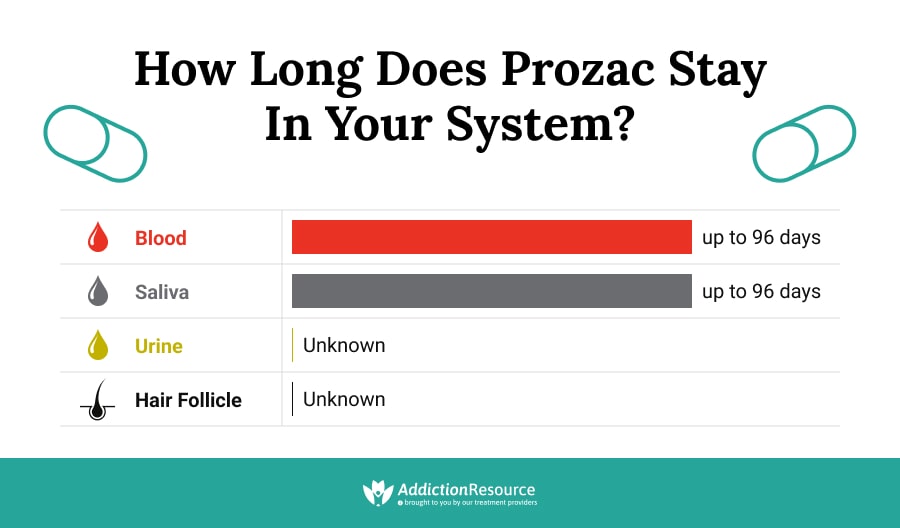Prozac is the brand name of the antidepressant medication fluoxetine. Fluoxetine belongs to the class of antidepressants known as selective serotonin reuptake inhibitors. The Prozac mechanism of action and its use in the treatment of certain mental conditions such as depression, obsessive-compulsive disorders, and anxiety is mainly due to its effects on serotonin. Prozac half-life is relatively long, and it can remain detectable within the body for different lengths of time depending on the tissue tested. Various factors affect the Prozac half-life and its elimination.
Table Of Contents:
How Long Does Prozac Stay in Your System and Tissues Such as Blood, Hair, and Urine?
Standard drug test kits do not detect the medicine, and Fluoxetine testing is not routinely carried out. However, special test kits may be used to test for the presence of Prozac within different tissue samples. The period the drug remains detectable can vary widely between the various body tissues, and the half-life of Fluoxetine in these tissues has not been firmly established.
Urine
Urine samples from individuals on Prozac have shown detectable levels as long as 96 days after their last dose. However, this study was carried out on individuals who have been using the antidepressant for an extended period.
Blood
Blood samples from individuals who were on Prozac for an extended period tested positive for the medication even 96 days after discontinuation of the substance.
Saliva
Due to a lack of research, there is insufficient evidence describing how long Fluoxetine can be detected within the saliva.
Hair
Generally, it is believed that Fluoxetine cannot be detected from hair samples. Therefore there is no detection time for the drug in the hair.

Prozac Metabolism
After taking the medication, its active ingredient called Fluoxetine is absorbed in the gut. It undergoes the first-pass metabolism in the liver, where it is metabolized via demethylation reactions into its norfluoxetine metabolites. Fluoxetine undergoes a demethylation reaction catalyzed by hepatic enzymes converting R- and S-fluoxetine to R- and S–norFluoxetine enantiomers respectively. After leaving the liver, Fluoxetine with its norFluoxetine metabolites is circulated in the bloodstream to the tissues.
How Long Does Prozac Take to Work?
Like most antidepressants, the mental health benefits of Fluoxetine are not seen immediately after the treatment is started. Some individuals may notice improvements within two weeks of starting treatment, but it usually takes about 4-6 weeks of treatment before the full mental health benefits are seen.

What Does Fluoxetine Do?
Fluoxetine belongs to the group of antidepressants called Selective Serotonin Reuptake Inhibitors (SSRIs), which cause an elevation in the mood when used over a prolonged period. The Prozac mechanism of action works by preventing the reabsorption of serotonin back into the brain neurons, therefore prolonging the action of serotonin. Serotonin is an important neurotransmitter that is closely linked with mood stabilization and normal mental health. Low serotonin levels within the brain have been closely linked to depression and other symptoms such as anxiety.
Prozac Half-life Timeline
Half-life is the amount of time it takes for the concentration of the medication within that blood to fall to half of the original value after taking the drug. The half-life of Fluoxetine is about 2 to 7 days; however, norfluoxetine lasts longer with a half-life of 4 to 15 days. Fluoxetine stays in the system for about 2 to 3 months after the last dose when nor-Fluoxetine is wholly excreted. This prolonged half-life of norFluoxetine is responsible for the long duration of some of Fluoxetine’s adverse effects, such as depression and sexual side effects.

When an individual quits treatment with the antidepressant abruptly, the body will react in specific ways. These adverse health reactions are called withdrawal symptoms. Some of these withdrawal symptoms include anxiety, mood swings, rebound depression, fatigue, dizziness, headache, muscle cramps, insomnia, and tremors. For a Fluoxetine overdose, withdrawal symptoms can be more severe and impede the elimination from the body.
Factors that Determine How Long the Drug Stays in the Body
Generally, how long the medication stays within the system after taking a dose varies greatly depending on several factors. While some individuals may completely excrete the drug as early as 21 days, it may take close to 3 months to excrete it in other individuals completely.
Factors That Influence the Duration of the Drug Within the Body Include:
- Individual Differences. Individual factors which determine the length of the Fluoxetine half-life within the body include age and sex, body weight, liver function and health, genetic profile, and metabolic rate. Elderly individuals usually have a longer Fluoxetine half-life than young adults. Also, the larger an individual’s body weight, the longer the half-life of Prozac due to the large surface area for tissue deposition. Liver impairment, food intake with drugs, and genetic variants causing underexpression of certain liver enzymes are associated with a long Prozac half-life.
- Duration of Use. Patients who have been taking Fluoxetine for a prolonged duration are likely to have the drug accumulate more in certain tissues. The longer the duration of use, the longer the tissue deposition and a consequent increase in the Fluoxetine half-life. Furthermore, the longer the duration of use, the more likely an individual is to develop the long-term effects of such medication, for example, anxiety and sleep disturbances.
- Drug Interactions. Co-administration with other drugs may affect the rate of metabolism and the Prozac half-life. Drugs that affect the function of the cytochrome P450 enzymes will, in turn, affect the rate of metabolism and extend or shorten the half-life of Prozac.
Getting The Drug Out Of the System
People may want to stop using this drug for various reasons. Some can experience more severe side effects, like weight loss on Prozac, others may feel that their body is developing dependency. It is always essential to speak with your physician if you wish to discontinue a drug like Prozac. This is because of the withdrawal symptoms associated with stopping the medication. Therefore you will most likely be required to taper the dose gradually. However, this does not ensure that this weaning process will be completely symptom-free. That is why seeking professional help at a rehab center is vital. They provide you with the medical expertise, support, and structure you need to completely rid yourself of Fluoxetine.
Page Sources
- Gury, C., & Cousin, F. (1999). Pharmacocinétique des ISRS: notion de demi-vie d'élimination et implications cliniques [Pharmacokinetics of SSRI antidepressants: half-life and clinical applicability]. L'Encephale, 25(5), 470–476. https://www.ncbi.nlm.nih.gov/pubmed/10598311
- Bergstrom, R. F., Beasley, C. M., Jr, Levy, N. B., Blumenfield, M., & Lemberger, L. (1993). The effects of renal and hepatic disease on the pharmacokinetics, renal tolerance, and risk-benefit profile of fluoxetine. International clinical psychopharmacology, 8(4), 261–266. https://doi.org/10.1097/00004850-199300840-00009
- Altamura, A. C., Moro, A. R., & Percudani, M. (1994). Clinical pharmacokinetics of fluoxetine. Clinical pharmacokinetics, 26(3), 201–214. https://doi.org/10.2165/00003088-199426030-00004
- Sohel, A., Shutter, M., & Molla, M. (2021). Fluoxetine. https://www.ncbi.nlm.nih.gov/books/NBK459223/
- Altamura, A. C., Moro, A. R., & Percudani, M. (1994). Clinical pharmacokinetics of fluoxetine. Clinical pharmacokinetics, 26(3), 201–214. https://doi.org/10.2165/00003088-199426030-00004

 Authored by
Authored by  Reviewed by
Reviewed by 

